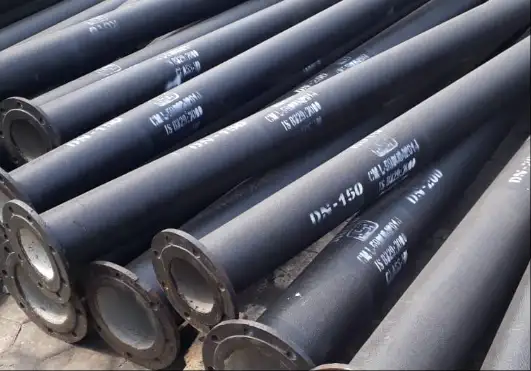A DI (Deionized) water pipe is an integral component in systems that transport deionized water—water that has had its mineral ions removed through a purification process. These pipes are crucial in industries where high-purity water is essential for processes such as semiconductor manufacturing, pharmaceuticals, and laboratory research.

1. What is Deionized Water?
Deionized water, often abbreviated as DI water, is water that has been purified to remove mineral ions such as calcium, magnesium, sodium, chloride, sulfate, and bicarbonate. This is typically achieved through ion-exchange processes, where charged particles are replaced with hydrogen and hydroxide ions, resulting in water with a very low total dissolved solids (TDS) level.
Characteristics of Deionized Water:
-
High Purity: Contains minimal dissolved minerals.
-
Corrosive Nature: Due to the absence of ions, DI water can be aggressive and may corrode metals over time.
-
Conductivity: Its low conductivity makes it suitable for sensitive applications.
2. Importance of DI Water Pipes
DI water pipes are designed to transport high-purity water without introducing contaminants. The choice of materials and construction methods ensures that the water remains free from impurities that could affect sensitive processes.
Key Functions:
-
Maintaining Purity: Prevents contamination from external sources.
-
Durability: Resists corrosion and degradation over time.
-
Efficiency: Ensures consistent flow and pressure for industrial processes.
3. Applications of DI Water Pipes
DI water pipes are utilized in various industries where high-purity water is essential:
Semiconductor Manufacturing
In semiconductor fabrication, DI water is used for rinsing wafers and cleaning equipment. Contaminants in the water can lead to defects in microchips, making the integrity of DI water pipes paramount.
Pharmaceutical Industry
The pharmaceutical industry requires DI water for the preparation of injectable medications and for cleaning equipment. Any impurities can compromise the safety and efficacy of drugs.
Laboratory Research
Researchers use DI water to prepare solutions and clean glassware. Contaminants in the water can interfere with experiments and lead to inaccurate results.
Power Generation
In power plants, DI water is used in cooling systems and for steam generation. Impurities in the water can cause scaling and corrosion, affecting the efficiency of the plant.
4. Materials Used in DI Water Piping Systems
Selecting the appropriate material for DI water pipes is crucial to prevent contamination and ensure system longevity. Common materials include:
Stainless Steel
-
Advantages: Highly resistant to corrosion and leaching.
-
Considerations: May be susceptible to stress corrosion cracking under certain conditions.
Polyvinyl Chloride (PVC)
-
Advantages: Lightweight and resistant to chemical attack.
-
Considerations: Not suitable for high-temperature applications.
Cross-Linked Polyethylene (PEX)
-
Advantages: Flexible and resistant to scale and chlorine.
-
Considerations: May degrade under UV light exposure.
Copper
-
Advantages: Naturally antimicrobial properties.
-
Considerations: Can corrode in DI water over time.
5. Design and Installation Considerations
Proper design and installation of DI water piping systems are essential to ensure their effectiveness and longevity:
Pipe Sizing
Correct sizing ensures adequate flow rates and pressure levels.
Jointing Methods
Welded or fusion joints are preferred to minimize leak points.
Support and Alignment
Proper supports prevent sagging and misalignment, reducing stress on the pipes.
System Testing
Pressure testing and flushing are conducted to ensure the system is free from contaminants and leaks.
6. Maintenance and Cleaning of DI Water Pipes
Regular maintenance is vital to keep DI water systems functioning efficiently:
Regular Inspections
Routine checks for leaks, corrosion, and blockages help identify potential issues early.
Cleaning Protocols
Cleaning agents compatible with DI water should be used to remove scale and biofilm.
System Flushing
Periodic flushing with DI water ensures the removal of accumulated contaminants.
7. DI Water Pipes vs. Other Water Piping Systems
Comparing DI water pipes with other types of water piping systems highlights their unique requirements:
| Feature | DI Water Pipes | Standard Water Pipes |
|---|---|---|
| Material Compatibility | Stainless Steel, PEX, PVC | Copper, Galvanized Steel |
| Corrosion Resistance | High | Moderate to Low |
| Purity Maintenance | Critical | Less Critical |
| Cleaning Frequency | High | Moderate |
8. Frequently Asked Questions (FAQs)
Q1: Why is DI water used in semiconductor manufacturing?
DI water is essential in semiconductor manufacturing because it is free from ions and contaminants that could cause defects during the wafer cleaning process. Even trace amounts of impurities can lead to significant issues in microchip performance.
Q2: Can DI water pipes be used for potable water?
No, DI water pipes are not suitable for transporting potable water. The materials used in DI water piping systems are selected to prevent contamination of high-purity water and may not meet the standards required for drinking water systems.
Q3: How often should DI water pipes be cleaned?
The cleaning frequency of DI water pipes depends on factors such as water quality, system design, and usage. Regular inspections and monitoring can help determine the appropriate cleaning schedule to maintain system efficiency.
Q4: What are the signs of contamination in a DI water system?
Signs of contamination include changes in water quality, such as increased conductivity or the presence of particles. Regular testing and monitoring can help detect contamination early and prevent damage to the system.
Q5: Are there alternatives to DI water for industrial applications?
Yes, alternatives like reverse osmosis (RO) water are used in some applications. However, DI water offers higher purity levels, making it preferable for processes where even trace contaminants can affect outcomes.
9. Conclusion
DI water pipes play a crucial role in industries requiring high-purity water. Understanding their applications, materials, and maintenance needs ensures the efficiency and longevity of these systems. By selecting appropriate materials and adhering to proper maintenance protocols, industries can maintain the integrity of their DI water systems and support the quality of their processes.

